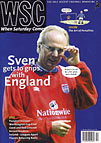 John Beck's return to Cambridge has delighted some but disgusted others. Simon Knott explains why there is such a difference in opinion
John Beck's return to Cambridge has delighted some but disgusted others. Simon Knott explains why there is such a difference in opinion
And so, he’s back. The man who gave us our proudest moments as Cambridge United fans returns under a cloud, albeit someone else’s. John Beck’s reappearance in the Cambridge hot seat has been greeted with a few gasps of horror and revulsion. These have mainly come from younger fans, brought up on Roy McFarland’s gentle arm-round-the-shoulders dressing room diplomacy, as well as the horror stories of their parents; there are mums on Ditton Fields who still threaten their naughty children with what Beck might do to them.